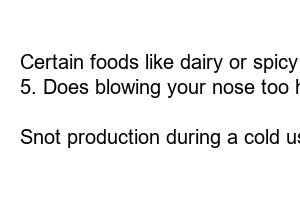코딱지가 자주 생기는 이유
Do you find yourself constantly reaching for a tissue to wipe away the all too familiar sight of **snot**? You’re not alone. **Snot** is a common occurrence in the English language, and there are several reasons why it happens. Let’s dive into the world of **snot** and explore why it’s so prevalent.
**What is Snot?**
Snot, also known as nasal mucus, is a viscous substance produced by the mucous membranes in the nose and respiratory tract. It plays an important role in trapping dust, bacteria, and other particles to prevent them from entering the lungs.
**Why Does Snot Occur?**
Snot is primarily produced as a defense mechanism to protect the respiratory system from foreign invaders like bacteria and viruses. When the mucous membranes detect a threat, they increase mucus production to trap and expel the harmful particles.
**Common Triggers of Excessive Snot**
Allergies, infections, cold weather, dry air, and irritants like smoke or pollutants can all trigger an increase in snot production. These factors can irritate the mucous membranes, causing them to release more mucus in an effort to protect the body.
**How to Manage Excessive Snot**
If you find yourself dealing with an abundance of snot, there are a few things you can do to manage it. Drinking plenty of water, using a humidifier, staying away from irritants, and using saline nasal sprays can help thin out and clear the mucus.
**When to See a Doctor**
If your snot is discolored, accompanied by a fever, or lasts for an extended period of time, it may be a sign of an underlying issue that requires medical attention. Make sure to see a doctor if you experience these symptoms.
**Conclusion**
Snot may be a nuisance, but it serves an essential purpose in protecting our respiratory system from harm. By understanding why snot occurs and how to manage it, you can keep your nasal passages clear and your immune system strong.
**FAQs**
1. What color should healthy snot be?
Healthy snot is typically clear or white. Discolored snot may indicate an infection.
2. Can allergies cause excessive snot production?
Yes, allergies are a common trigger for increased snot production.
3. Is it normal to have snot every day?
Yes, it is normal to have some amount of snot on a daily basis as it helps protect the respiratory system.
4. Can diet affect snot production?
Certain foods like dairy or spicy foods may increase snot production in some individuals.
5. Does blowing your nose too hard cause damage?
Blowing your nose too hard can irritate the mucous membranes and lead to more snot production.
6. How long does snot typically last during a cold?
Snot production during a cold usually peaks within the first few days and gradually decreases as the illness resolves.

